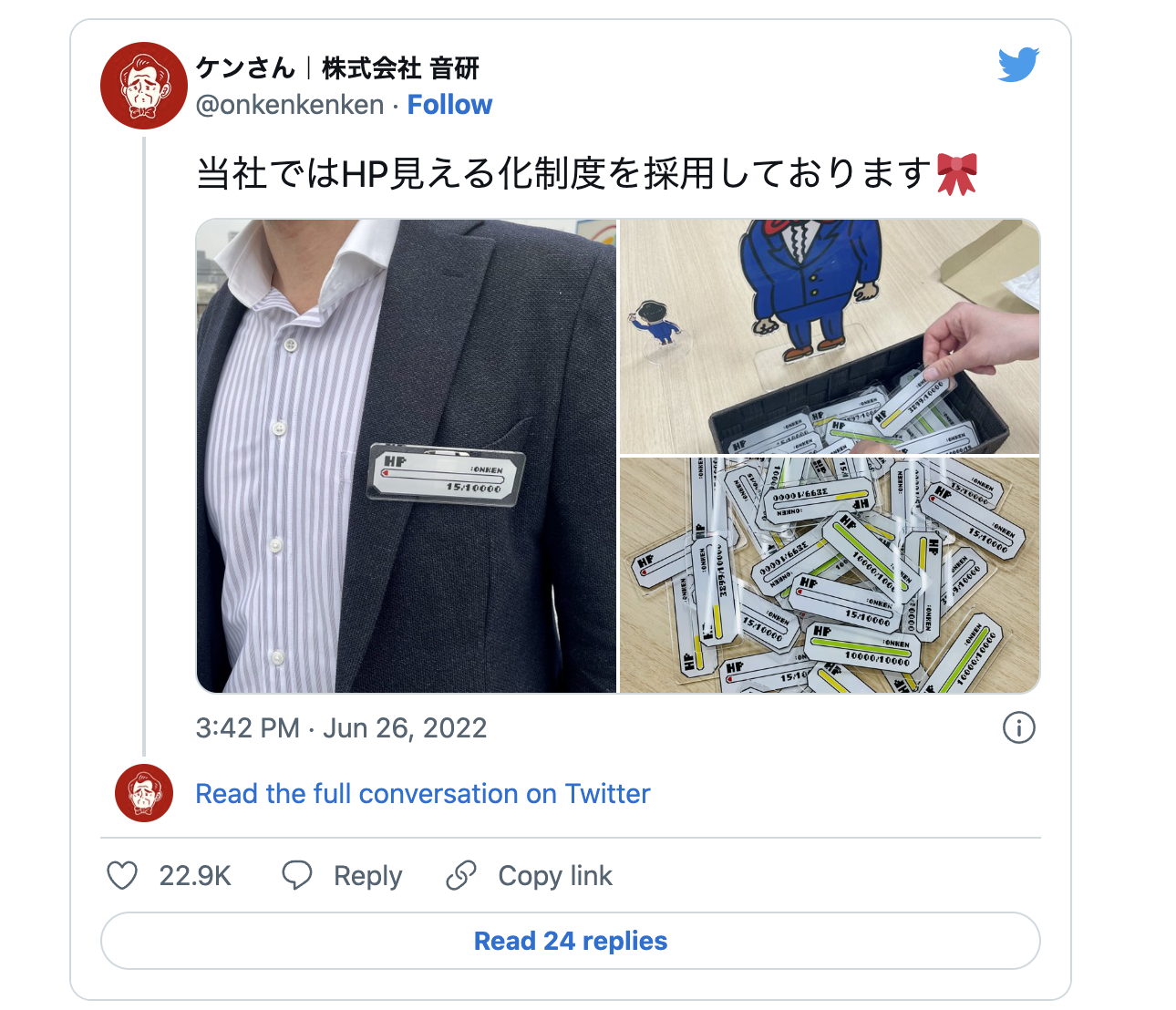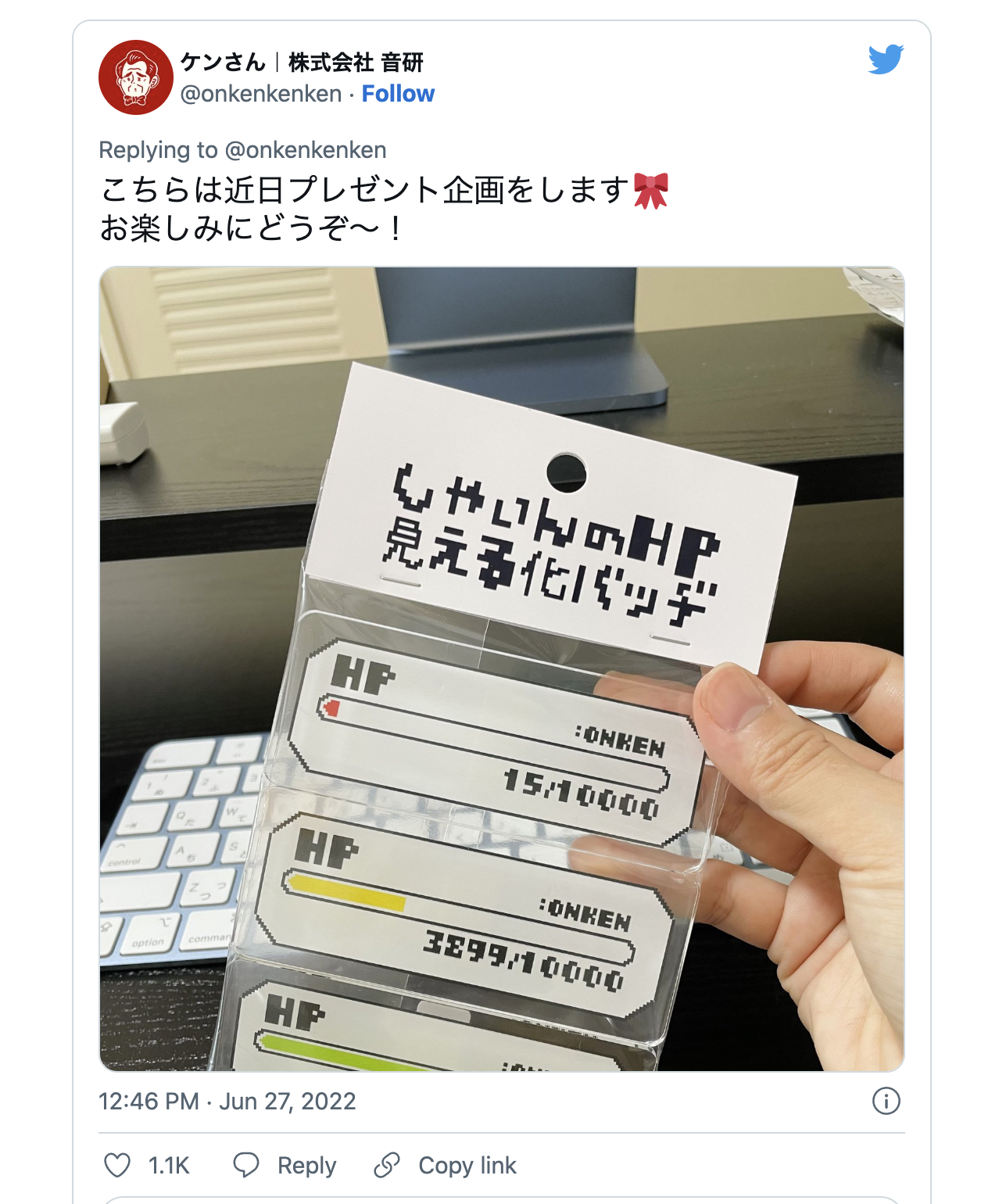Japanese companies are big on the concept of “communication.” All the meandering meetings, analog face-to-face interaction, and implicitly required after-work meals and drinks with coworkers are, ostensibly, so that everyone in the office will have a better understanding of what everyone else in the office has on their plate and how they’re coping with it.
There are, however, some potential problems with this model. Oftentimes the expectation is that if someone is indeed struggling with their assignments or projects, their coworkers will be able to pick up the fact through incidental chitchat. Unfortunately, since Japanese cultural values stress the importance of an individual meeting their responsibilities to the group, many people are uncomfortable openly and directly telling their coworkers that they’re having a hard time, and instead try to hide the fact that they’re running out of energy.
So to address this problem, Tokyo logistics and media company Onken has taken a cue from video game user interface design, and created employee badges with RPG-style hit point gauges on them.
▼ “Our company has introduced a visible HP system.”

Each employee gets three badges: a green bar indicating a completely full 10,000 HP, a yellow bar for 3,899 HP, and a critical-condition red bar for when they’re down to just 15 HP left. Workers are at their own discretion to wear whichever badge best matches their current condition, allowing them to clearly but unobtrusively let their coworkers know how much capacity they have for extra assignments, overtime work, and the like.
Onken says it understands that employees’ mental and physical conditions can fluctuate from both work-related and private-life factors, but that it’s not always easy to speak up when they’re feeling run down.

“So if someone is wearing a low-HP badge, do people try to treat them extra kindly?” asked one Twitter user, to which Onken replies “Yes, they do!”
Other online reactions have included:
“What a great idea. I want to work at this company!”
“The design is cute, and the concept is so sweet and considerate.”
“Everything is easier to understand when you’ve got a visual representation.”
“I’m usually pretty low on hit points on Mondays and Fridays.”
“I feel like my HP is always at critical.”
“I wish my company would adopt this system.”
“I totally want badges like these!”
Right now, it’s only Onken employees who have access to these badges, but after seeing the positive reaction they’ve been getting, the company says it plans to start selling them later this month.
Related: Onken
Sources: Twitter/@onkenkenken, IT Media
Read more stories from SoraNews24.
-- Japanese woman wants office romance but has no job, figures out how to make her dream come true
-- Five ways to piss off your older Japanese coworkers at a new job
-- Is this common Japanese phrase for “goodbye” the reason for Japan’s crazy overtime hours?
© SoraNews24 Take our user survey and make your voice heard.
Take our user survey and make your voice heard.















9 Comments
Login to comment
virusrex
So, to help people that do not feel comfortable asking for help to their close coworkers that could do something to help they can now wear a badge that announce it for everybody to see?
That does not seem like a logical step, if the person thinks he would be considered inferior to their coworkers by asking for help privately it would follow that doing it publicly (to unrelated people, their bosses, etc.) would be an even more difficult step to do.
Fox Sora Winters
Pretty sure that if HP gauges were an actual thing IRL, mine would permanently be at 1 HP.
All jokes aside, this isn't going to work out the way Onken seems to think it will. Not many, if any, would be brave enough to wear the yellow HP badge, let alone the critical. Doing so would likely result in a barrage of questions, as well as silent judgement, behind-the-back gossip, and criticism from management (especially HR, who forever seem to be seeking to "trim the fat" by getting rid of people it can't abuse). So for the sake of a quiet life, and for their jobs, everyone would wear the green badges even if the truth is far from it.
GBR48
Just sort out your problems directly like grown adults, not by creating childish personal signposts to stick on yourselves.
JTC
This is a terrible idea - it'll be like anyone with low HP is one to avoid - as they'll be next for the chop.
Also, I bet it could be manipulated - just like the CCP uses its COVID Traffic lights app to control members of the Public.
shogun36
I’d like to see the definition of THIS “communication.”
That seems like one of the bigger problems most Japanese companies have is “lack of communication.”
And are you kidding me?
no one is wearing the red or yellow tag.
they’ll either be seen as incompetent or lazy. (Not everyone, some are legitimately swamped, but you definitely know who the slackers are.)
OR
it means the company is overworking them due to lack of workers, because of “labor costs” (most likely)
but even if others do offer to help, the general consensus in an office is, “that’s not my job” or “that’s not my problem, I don’t want to have the blame put on me.”
but if anything, this should be fun to watch and see how it plays out.
would definitely like to hear about this office, 6 months down the line, and how it’s affecting the work environment.